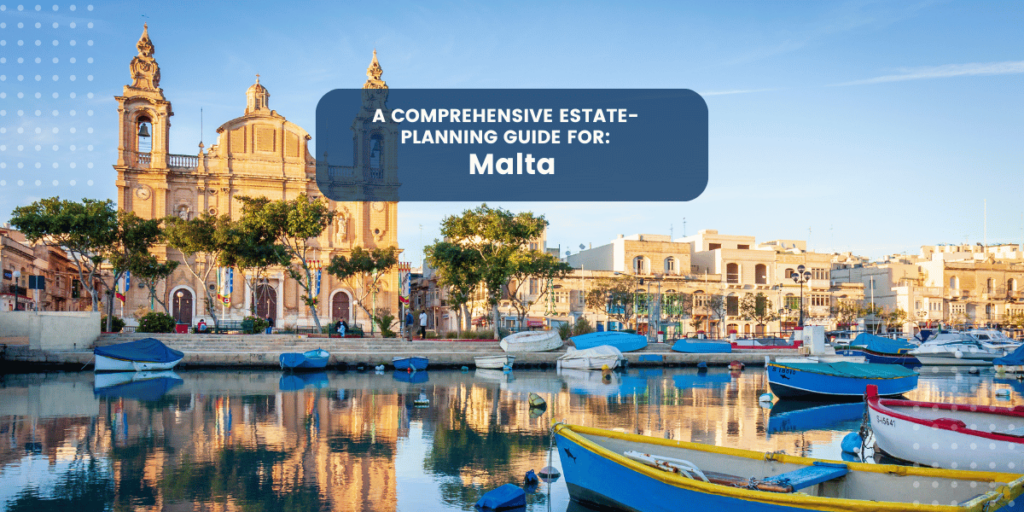Estate Planning in Malta: A Comprehensive Guide to Safeguarding Your Legacy
Introduction
Malta, with its Mediterranean charm, thriving economy, and deep-rooted traditions, provides a unique environment for estate planning. Renowned for its favorable tax policies and as a hub for expats and businesses, Malta is a gateway to Europe and a popular destination for global wealth management.
However, navigating Malta’s inheritance laws and cross-border estate considerations requires careful planning. The Wills App simplifies the process by offering secure digital storage, automated legacy distribution, and tools tailored to ensure your wishes are respected.
Overview of Estate Planning in Malta
Inheritance Laws
Malta’s inheritance system is governed by civil law, prioritizing family members and enforcing specific property division rules:
- Forced Heirship Rules: A portion of the estate is reserved for spouses and children.
- Succession Rights: Rules differ based on the property type and the marital status of the deceased.
- Intestate Succession: Without a will, Maltese law determines how assets are distributed.
Standard Estate Planning Documents in Malta
- Last Will and Testament: Specifies the distribution of assets upon death.
- Power of Attorney (POA): Authorizes a trusted person to handle financial or healthcare decisions.
- Trusts and Foundations: Common tools for wealth management and succession planning.
- Advance Care Directive: Details healthcare preferences in critical situations.
Creating a Will or Equivalent Estate Plan in Malta
Required Documentation
- Proof of identity (e.g., ID card or passport).
- Asset documentation, such as property deeds or bank statements.
- A list of beneficiaries and their details.
Legal Requirements
- Witnesses: Two witnesses must be present during the signing of the will.
- Notarization: Wills must be notarized for legal validity.
- Registration: Registering the will with Malta’s Public Registry adds an additional layer of security.
Step-by-Step Guide
- List your assets and identify beneficiaries.
- Choose a trusted executor to manage the estate.
- Draft your will with the assistance of a licensed notary or legal professional.
- Store your will securely, using the Wills App for digital backup and automation.
Tax Implications
Malta does not impose inheritance tax, but certain transactions, like property transfers, incur a 5% stamp duty. For cross-border assets, consult a tax advisor to understand any foreign obligations.
Navigating Local Challenges in Estate Planning
Estate planning in Malta may involve challenges such as:
- Forced Heirship Rules: Limitations on freely distributing assets.
- Cross-Border Complexity: Handling international assets and beneficiaries.
- Lack of Awareness: Limited understanding of estate planning tools among locals.
The Wills App overcomes these hurdles by providing:
- Secure storage for wills and supporting documents.
- Automated delivery of messages and legal instructions to heirs.
- Cross-border estate planning solutions for global users.
Unique Aspects of Estate Planning in Malta
- Trusts and Foundations: Widely used for asset protection and succession planning.
- Cross-Border Considerations: Critical for expats and individuals with international property or investments.
- Pet Guardianship: Growing in popularity as people include pets in their estate plans.
Using the Wills App to Secure Your Legacy
The Wills App offers cutting-edge features that simplify estate planning:
- Secure Storage: Digitally store wills, trusts, and directives for easy access.
- Inactivity Timer: Automatically triggers the execution of plans when pre-set conditions are met.
- Posthumous Communication: Schedule delivery of video messages and letters to loved ones.
Ethical Will and Memory Preservation
Concept of Ethical Wills
An ethical will shares personal values, beliefs, and life lessons with loved ones, offering an emotional legacy alongside material wealth. In Malta, where family is central, this can be a meaningful addition to estate planning.
How the Wills App Supports Ethical Wills
- Record video messages to convey personal values.
- Write heartfelt letters to leave a lasting impact.
- Preserve traditions and cultural heritage for future generations.
Key Estate Planning Tips for Malta
- Familiarize yourself with Malta’s forced heirship laws to understand your limitations.
- Register your will with the Public Registry for added security.
- Consider trusts for complex estates or international assets.
- Consult a tax advisor to address cross-border implications.
- Include healthcare directives and guardianship clauses for a comprehensive plan.
Frequently Asked Questions (FAQs)
1. What happens if I die without a will in Malta?
The estate is distributed based on Maltese intestacy laws, prioritizing spouses and children.
2. Are there inheritance taxes in Malta?
No, but a 5% stamp duty applies to property transfers.
3. Can expats create wills in Malta?
Yes, provided they comply with Maltese legal requirements.
4. What documents are needed for estate planning in Malta?
Identification, asset documentation, and a drafted will.
5. How does forced heirship work in Malta?
A portion of the estate must go to the spouse and children, regardless of the will.
6. Can I include digital assets in my will?
Yes, ensure clear documentation of online accounts and passwords.
7. Is it necessary to notarize a will in Malta?
Yes, notarization is required for legal validity.
8. How can I ensure my will is followed?
Register the will and appoint a reliable executor.
9. What is an ethical will?
A document or message sharing personal values and life lessons with loved ones.
10. How does the Wills App help with estate planning in Malta?
It provides secure storage, automated delivery, and tools for creating ethical wills.
Disclaimer
Have more questions? Explore additional topics in our Learning Center or connect with our Customer Support. Wills.com provides easy-to-use legal forms and resources for estate planning. Please note that we are not a law firm and do not offer legal advice. The details in this article may be subject to change as laws, customs, and regulations evolve.



